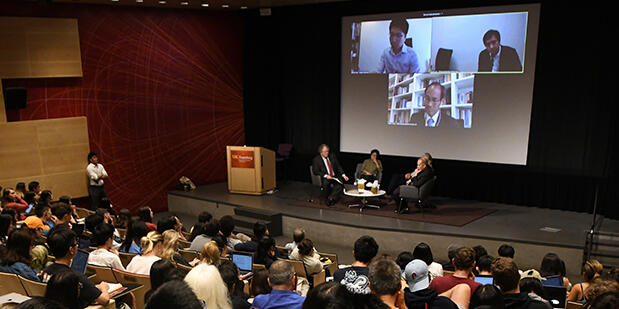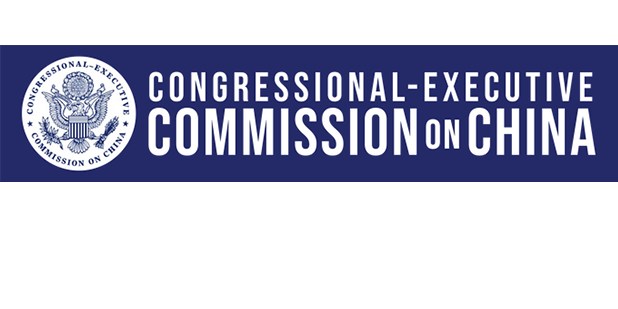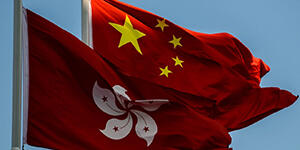Panelists
- Robert Chung, Public Opinion Research Institute, Hong Kong
Prof. Chung taught at the University of Hong Kong for three decades and launched its well-known and highly-regarded public opinion program.
- Robert Koepp, Director and the Chief Economist, the Corporate Network in Hong Kong for The Economist Group
Mr. Koepp has published on a wide-variety of topics and contributes to the network's annual Asia Business Outlook Survey. He's the author of two books.
- Fiona Ng, Senior Producer for Air Talk with Larry Mantle
Ms. Ng is a veteran journalist who has written on a number of topics focusing on Chinese and Chinese Americans. She's just returned from a reporting trip to Hong Kong.
- Francis Lee, Professor, Chinese University of Hong Kong
Prof. Lee is the director of the university's School of Journalism and Communication. He's published extensively including two books on the Umbrella Movement. On Oct. 16, 2019, Prof. Lee published an update to the surveys his team have been conducting into Hong Kong public opinion. He wrote, "One clear explanation for this stability [39-41% of the public believing the protestors were using excessive violence] is that the public have consistently viewed the police as far more violent and abusive. As protesters have graduated from simply throwing bricks to using petrol bombs and vandalising targeted shops, police tactics have escalated in parallel, going beyond tear gas and rubber bullets to deploying specialised crowd management vehicles and firing live rounds."
- Samson Yuen, Assistant Professor, Department of Political Science at Lingnan University in Hong Kong
Prof. Yuen studies comparative politics, focusing on authoritarian and hybrid regimes. He's leading a team carrying out surveys among protestors, counter protestors and the general public.
Moderated by Clayton Dube, Director of the USC U.S.-China Institute.
This event was part of Communication 310 course, “Media and Society,” taught by Professor Robert Scheer. Prof. Scheer joined the discussion. There were also questions from the audience, but as is our norm, we do not include them here.
Video of the presentations and the discussion among the presenters is below. A few highlights:
Clayton Dube provided an overview of the recent protests in Hong Kong, noting the vital role played by millennials and those born since the 1997 handover. He pointed to the deep suspicion protestors have of both the Hong Kong and Beijing governments.
Other useful documents: Joint Declaration by the PRC and UK (1984); Basic Law of the Hong Kong Special Administrative Region (1990)
Fiona Ng noted that her family was one of those who migrated to the U.S. ahead of the 1997 handover. She noted the ways she followed events in Hong Kong and discussed what she saw and learned there during a recent reporting trip. She noted the creativity of the protestors, which included new songs or new versions of old songs.
Robert Chung discussed the low opinion most Hong Kong people have of the performance of the local government and the chief executive, Carrie Lam. He also showed that while a majority of people opposed the extradition bill, opposition among young people was overwhelming. People with higher levels of education were more critical than others of the government.
Francis Lee's surveys showed that beliefs about the legal system on the mainland were an important driver of attitudes toward the extradition bill and the Hong Kong government that proposed it. He noted that six in ten did not believe a fair trial was possible for those extradited to the mainland. His surveys showed that most people were critical of the use of force by the police and, as a result, really wanted an independent investigation of the policies and actions of the police. 40% felt that some protestors had used excessive violence.
Samson Yuen noted the many ways that people participated in the protests: marching, contributing money or assistance, and publicizing the concerns and activities. Some 75% of the protestors he surveyed were college students or college graduates. About half identified as middle class and a smaller share identified as being of a lower economic class. His research showed the essential role played by social media in mobilizing and spreading news of the protests.
Robert Koepp highlighted the current economic impact of the demonstrations. He noted that Hong Kong is dependent on the mainland for most of its tourists and that mainland visitors had essentially stopped coming and buying luxury goods. He also pointed to drops in the Hong Kong stock market and in property prices. At the same time, he noted that there was not capital flight. Koepp observed that Hong Kong has a functioning judicial system and that rule of law is the norm, pointing to the respect shown the court injunction against hampering the flow of people at the airport.
The discussion included questions about the motivations of demonstrators and the centrality of political questions. There was also discussion of how the demonstrations affected conversations among friends and colleagues and the perceived role of violence in getting demands met or in radicalizing protestors.
The presentations and discussion were lively and rich. Please share these videos with others.




